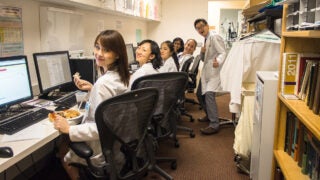Three Stories from the COVID-19 Front Lines Inspire Healing and Hope
Keck Medicine of USC health care workers share memories from the pandemic.
Dedicated doctors, nurses, therapists and staff at Keck Medicine of USC found themselves on the front lines in the fight against COVID-19 this spring. Here three health care workers share their experiences of fighting the coronavirus in Los Angeles, in their own words.
Respiratory Therapist: Brian Dodero
Brian Dodero might insert a breathing tube into a patient’s throat one moment, then perform life-saving CPR on another a few minutes later. He serves as one of Keck Hospital of USC’s respiratory therapists, one of the most important — and riskiest — jobs of the coronavirus era. Dodero has helped a lot of patients, but the 43-year-old remembers one man in particular.
He was a little younger than me but not by much. I don’t believe he had a previous medical condition, but he came in positive for COVID-19 and was very critically ill on a ventilator.
This type of disease causes acute respiratory distress syndrome — it’s an excess buildup of fluid in the lungs that basically drowns the patient. We need to turn them to try to get that fluid to move so we can ventilate different areas of the lungs. We have four people in the room together just to turn the patient. You have to imagine: they have tubes and lines coming out from all over their body, they have an endotracheal tube coming out of their mouth. If they’re lying on their stomach, where’s that tube going to go? You have to turn their head, position them carefully.
This gentleman was on a ventilator for 17 days. But he recovered and left the hospital. To me, that was incredible.
Seeing a younger patient like that in such a critical situation was scary, because all you hear on the news is that young people are fine. He wasn’t fine. He was on death’s door. But he pulled through and recovered. And it was because of great teamwork — the doctors, the nurses, the respiratory therapists who took care of him.
Musical Therapist: Miko Shudo
Normally assigned to older patients in psychiatric care at USC Verdugo Hills Hospital, she saw her world change as COVID-19 patients arrived at the facility. Whenever she could, she played music to provide a little comfort.
On the hospital floors, I’d set up a chair by a pod of patients’ rooms and play something very soft and consistent. It’s not really to perform but to create an ambience of relaxation. I play maybe 10 minutes in one spot and then move to the next pod of rooms.
One time, as I began playing, I saw a door was shut and a COVID-positive patient was inside the room. I stayed close to that door and played one of my normal relaxation progressions. After I finished, I suddenly heard clapping.
I asked if they would like to hear another one, kind of just going through the conversation as if I were actually able to see them. I don’t remember what it was, whether it was something they said or it was more clapping, but they signaled to me that they wanted to hear more. And so I kept playing. In total, I probably played four songs for them.
Before playing the last one, I talked to them, saying that we’re thinking of you, that we’re out here, even though we can’t see you and interact with you in a more normal way. It was the best I could do in that moment. After the last song, they clapped again and then through the door I could hear, “Thank you.”
Anesthesiologist: Michael Kim
Specializing in critical care at Keck Hospital of USC, Michael Kim looks after the sickest patients, whether they’ve had organ transplants or COVID-19. He talks about the professionals who care about doing right by their patients — not about being called heroes.
Honestly, I think most of us approach work the same before and after COVID: We just deliver it. It’s our job. We trained hard to take care of sick patients, and we do just that.
I see it every day with physicians, nurses, environmental services workers, respiratory therapists, X-ray techs, nutritionists, occupational therapists, physical therapists. When I’m sitting around at night in our COVID unit, it’s really cool to watch all these people donning their PPE, delivering excellent care to these patients who are extremely sick.
If there’s a chance to talk to patients, you reassure them that they have excellent caregivers around them. If the patient is intubated, all you can do is whisper in their ear — and let them know they are being well taken care of.
Interviews have been edited for flow and clarity.



